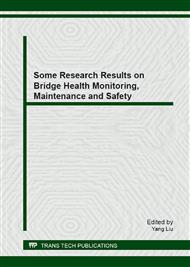p.1
p.11
p.21
p.29
p.37
p.47
p.55
p.63
Significant Failure Mode Identification for a CFST Arch Bridge System
Abstract:
The structural reliability analysis is the widely accepted method for bridge safety assessment. Identification the subset of significant failure modes is the most important part of system reliability estimation. In this paper, a stage critical strength branch and bound algorithm is proposed for the failure mode identification of bridge systems. The innovative method is implemented in the combination with the finite element package ANSYS and the MATLAB procedure. The suggest method is applied to a concrete filled steel tubular (CFST) arch bridges. The results reveal various combinations of the failure modes in significantly reduced time and efforts in comparison to the previous permutation method. Additionally, the suggested method can be used for the verification of the system reliability with more specific predictions of the failure mode.
Info:
Periodical:
Pages:
11-19
DOI:
Citation:
Online since:
January 2013
Authors:
Keywords:
Price:
Сopyright:
© 2013 Trans Tech Publications Ltd. All Rights Reserved
Share:
Citation:


